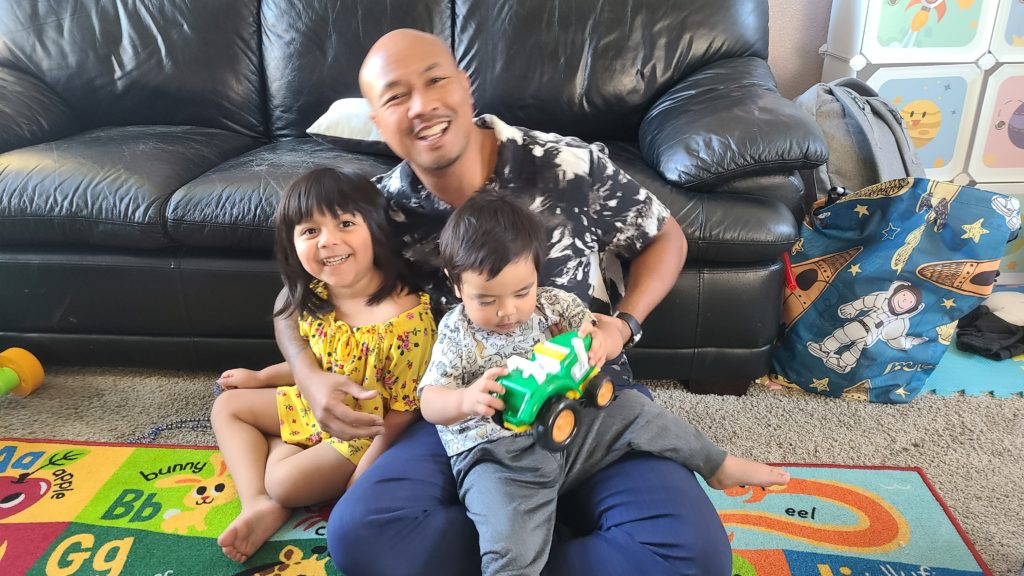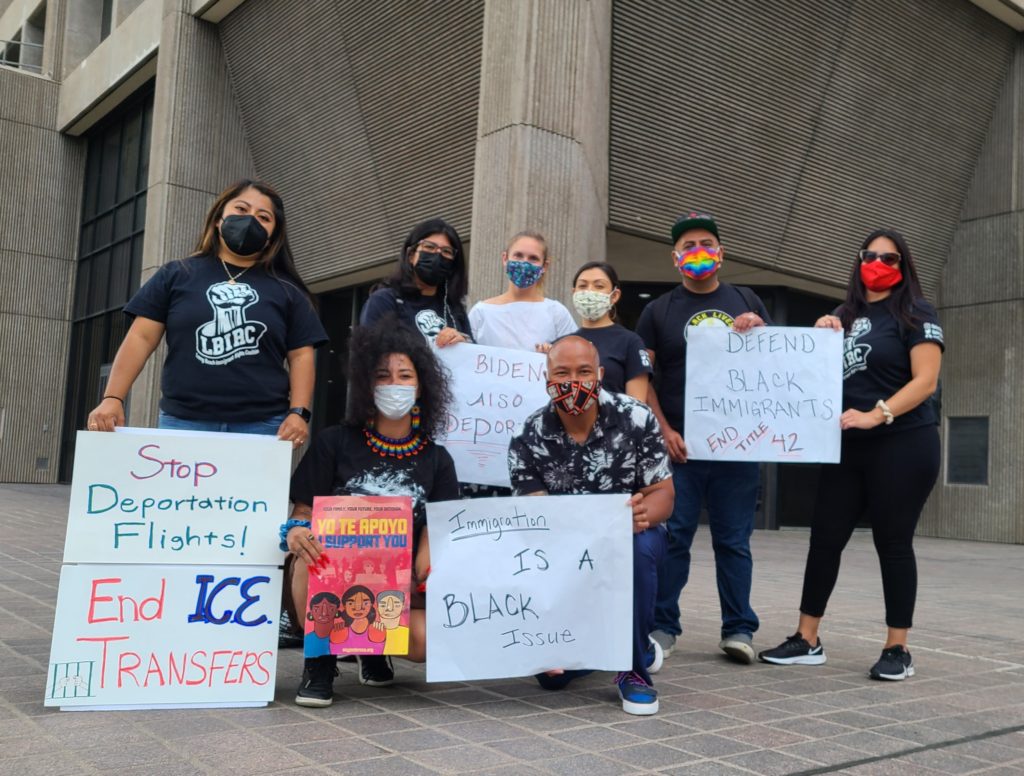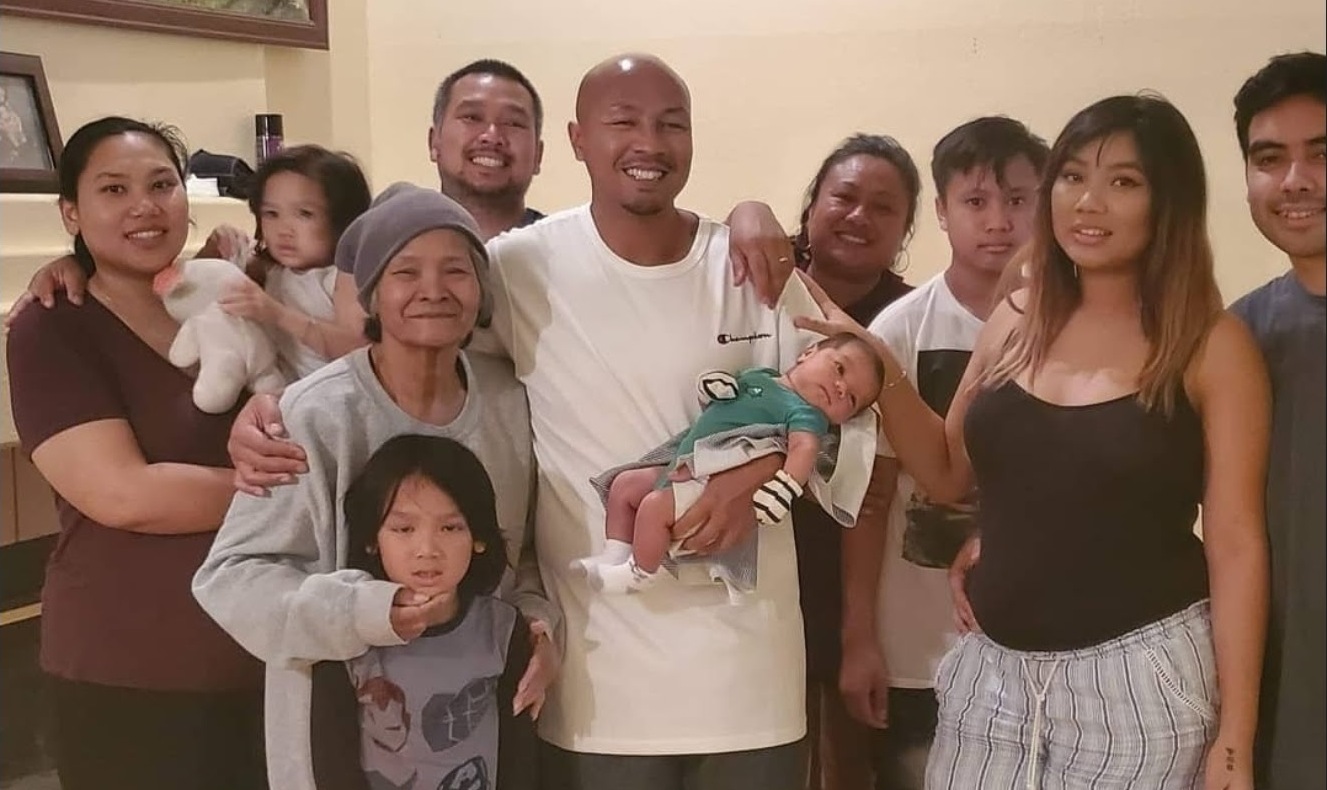Long Beach Resident Facing Deportation to Cambodia—A Country He’s Never Set Foot Inside
18 minute readIt should have been one of the happiest days of Sithy Bin’s life. After serving 15 years of a life sentence in state prison, he was on the verge of being let out early. On the outside, beyond the barbed wire and reinforced concrete, were his two daughters and two grandchildren, whom he hoped to meet for the first time.
It was May 23, 2020—a date that had been his singular focus for months. But as he was being shuffled toward the processing area, mere feet away from beginning a new life, correction officers abruptly separated him from the rest of the outgoing inmates without explanation. He was ordered to sit and wait in a holding cell.
“Slowly I start seeing everyone being released. They’re getting dressed up, getting their gate money, seeing who’s picking them up and all that. And I’m just watching, seeing the sunlight in sadness. I was about to see my family,” Bin said.
When two Latino inmates were seated next to him, a sinking feeling came over him as the reality of what was happening began to dawn on him. Bin was not a U.S. citizen.
FLEEING CAMBODIA
Bin’s parents fled Cambodia in 1980 after the genocidal Khmer Rouge took control of the country. Pregnant with him at the time, his mother trekked mountainsides to sneak across the border into Thailand. There, Bin was born in a refugee camp before moving on to another camp in the Philippines. Only a toddler when his family was granted asylum in the U.S., they landed in North Carolina in 1984.
Just as Bin was entering the third grade, his family moved again, this time to Modesto in Northern California. They settled in an apartment complex with about 100 other Cambodian refugee families, but Bin found it difficult to find a sense of belonging.
At home, his father—deeply traumatized from fighting in the Cambodian Civil War— was an alcoholic who endured constant nightmares. During the day, his parents would often leave him and his younger siblings alone at home while they went out foraging for aluminum cans to exchange for extra cash.
“My mom and dad were sleeping in separate rooms. My dad would have these nightmares and, you know, get all loud and crazy and just struggle in bed and all that,” he said. “There was no therapy or anything like that.”
At school, Bin was relentlessly bullied for being different—Modesto has a heavily Latino population. His first name, pronounced like “city,” became the fodder for cruel nicknames.
In the poverty stricken immigrant neighborhoods of west Modesto where Bin grew up, gang life seemed like a natural outgrowth of the community. By seventh grade, at age 13, he was jumped into the Crips with Attitude gang, which counted some of his cousins as members.
“I wanted to protect myself. I was seeking acceptance and approval because I wasn’t getting it at home. I felt abandoned, left alone. I felt a deep sense of rejection and had low self-esteem from being bullied,” Bin said.
He found the acceptance he sought but with it came the type of activity inherent with gang life. His reputation earned him the street name of Dragon. When a fellow CWA member was shot, Bin obtained a firearm for protection. Over the next decade, he bought his first car, enrolled in college, and became a father—all while continuing to rise in the ranks of the gang to become one of the top lieutenants in the area code.
“I had a double life. I was a full time college student and a gang member at the same time,” he said. “I became self-centered. I became a jerk.”
STRAY BULLET, ‘AHA’ MOMENT
On Sept. 2, 2005, Bin and some other CWA members drove to the home of a rival gang member who had been bullying some of the youth in his neighborhood.
After a verbal and physical altercation broke out in the front yard, Bin says he intended to fire warning shots, but one of those bullets struck a 39-year-old mom who had no gang affiliation and was attending a barbecue at the home. She was hit in the stomach and severely wounded, but survived, though the injury would inflict lifelong chronic pain.
Investigators recovered ten bullet casings at the scene, according to court records. Bin was arrested the next day and initially charged with attempted murder, among other charges and gun enhancements. When Bin found out one of the bullets from his gun had struck the mother, he said he was devastated.
“It was an ‘aha’ moment for me. I was like, man, I could have shot my own mom. I could have shot my sister, my aunt. That’s when it clicked for me. It registered for me, the negativity of that type of lifestyle and that faulty gang belief system.”
He remained jailed for three years during the lengthy trial process.
“I went into a depression. I lost 50 pounds in three months,” he said.
Feeling spiritually bereft, he began exploring religion while in prison, attending Christian workshops and Bible studies, eventually gaining enough experience and trust to co-facilitate these meetings.
In 2008, Bin was found guilty of shooting at an inhabited building, assault with a semiautomatic firearm, and being part of an active criminal street gang. He was 25 years old. The district attorney prosecuting the case recommended two consecutive life sentences, resulting in the judge handing down a combined term of 40-years-to-life in state prison. After bouncing around a few correctional facilities, he ended up at Avenal State Prison, somewhere between Fresno and Bakersfield.
This is where his transformation really began to accelerate. He signed up for virtually every prison program available, including Guiding Rage Into Power (GRIP), a one-year course based on the principles of restorative justice that helps incarcerated people develop their emotional intelligence. He also became an ordained pastor.
“I started placing my dependence on God in everything I do,” he said. “I took responsibility and accountability and then at the same time, with my relationship to God, I could see there was gonna be a purpose behind the consequences I faced for my actions.”
For the next decade, Bin would stack up the certificates and accolades while his abilities as a mentor to his fellow inmates caught the eye of corrections officials.
By 2018, Bin had served 13 years in prison and was resigned to dying in prison. But that July, the California Department of Corrections and Rehabilitation recommended Bin for a resentencing hearing before a judge.
The judge—coincidentally the same one who had initially sentenced him—was so impressed by Bin’s transformation that he reduced his term enough to be eligible to go before the parole board.
“The parole board came back after their deliberation and it was amazing. They came back and were like, ‘We want to commend you for showing remorse and for your past activity in prison,’” Bin said. “And then they even came around and shook my hand.”
ON THE OUTSIDE
Two hours had passed since Bin had been directed to sit in a holding cell at Avenal at the edge of freedom. That’s when a pair of Immigration and Customs Enforcement agents showed up and informed Bin of his fate. Because the crimes Bin had been convicted of fell under the category of aggravated felonies, a broad set of crimes defined under immigration law as deportable offenses, he had been slated for deportation.
He’d be taken to the Mesa Verde ICE Processing Facility in Bakersfield where he would be held until he could be put on a plane and deported to Cambodia, a country he had never once set foot inside.
“I was heartbroken. I was devastated,” Bin said. “I have no family over there. Nothing. I don’t speak or read or write Cambodian.”
Even though he wasn’t born in Cambodia, under a repatriation agreement with the U.S. the southeast Asian nation accepts green card holders of Cambodian descent who have committed aggravated felonies.
Bin spent three weeks in ICE custody but was set free after the American Civil Liberties Union sued to force the temporary release of dozens of detainees following a COVID-19 outbreak at the facility.
Under the terms of his release—known as an order of supervision—he had to wear an ankle monitor and report to ICE regularly. Bin, now in his 40s, entered a world deeply embroiled in a deadly pandemic and found that the most basic elements of society were walled off to him. He was turned away at the door of a transitional housing facility because he was undocumented. Getting a job was also a challenge because of his immigration status.
Bin says even everyday things most would take for granted, like getting an email address or buying a bus pass, can be challenging to those who have been locked away from society for years.
“I didn’t know how to order at Starbucks. That was one of my fears. I didn’t want to look foolish so I was avoiding Starbucks until my daughter helped me,” he said. “In prison you don’t hear no macchiato or anything like that.”
But through sheer perseverance and the help of his family and several mentors, he slowly began to find his independence seven months after being released. He found housing in Los Angeles, began working as a program administrator for a re-entry nonprofit in Inglewood, and found a welcoming congregation at Renew Church LA.
Tomisin Oluwole
Face the Music, 2022
Acrylic on canvas
24 x 36 inches
Click here to check out our interview with Tomisin Oluwole, a literary and visual artist based in Long Beach.

Instead of gunking up our site with ads, we use this space to display and promote the work of local artists.
But the challenges he had faced during his own re-entry spurred him to want to help other men who were in a similar position. He began working with several re-entry programs and co-founded the Made New Foundation, which helps connect formerly incarcerated people with resources and mentorship.
“My mentality was that there’s a good chance I’m gonna get deported within a year or two years when COVID gets lifted, so let me give back as much as possible before I get deported. So yeah, I just started volunteering,” Bin said.
Last year, he became a case manager for the nonprofit Friends Outside and he’s working on getting a bachelor’s degree.
One of his clients, Manuel Flores, spent five years in prison and then seven years homeless before meeting Bin through a mutual friend. The meeting forever changed his life, Flores says.
Working with the nonprofit Dream Live Hope Foundation, Bin got Flores into a transitional housing facility, where he now has access to substance use treatment counselors, employment assistance, and other resources that are helping him forge a new path ahead.
“He changed my whole life around. He got me out of the streets. He helped me to work with some pilot programs that helped pay my rent. If it wasn’t for him and his program, I’d be in the streets still being a drug addict,” Flores said. “I get emotional when I talk about him because he’s helped me so much.”
Those who know Bin call him an inspiration and attest to the positive impact he’s had in the community. For his part, Bin says he’s only trying to pay back the help he received when he was fresh out of prison.
“I want to lead them by my example, my walk, and cause a chain reaction, like paying it forward,” he said.
Bin says one of the pillars of his support system when transitioning back into the community was Dream Live Hope Foundation CEO Kevin Waters.
“I don’t see what the need would be to deport him,” said Waters. “He’s not a person who detracts from society. He’s an asset to any community that he’s involved in. He’s been an asset at the church. He’s been an asset within our transitional houses. He’s actually doing citizen work. And he’s not doing it to stay here. He’s doing it because that’s who he is.”
Bin has become so instrumental in establishing re-entry services in Long Beach, that he was invited to be part of the city’s Reentry Advisory Council by Mayor Robert Garcia and the Health Department.
“The difference he’s made in less than a year is just incredible. Nobody stands to benefit from Sithy being deported. And there’s probably hundreds of people whose lives would be really severely impacted,” said attorney Caitlin Bellis with the National Immigration Project of the National Lawyers Guild, who represents Bin.
Bin’s 23-year-old daughter Serienity Galvez said since he’s been released from prison, her father has been a deeply positive force in the lives of her family, including his grandchildren who view him as a role model.
“There’s so many people who love him, so many people here who respect him, and need him in their life like I need him in my life,” Galvez said. “If I’m feeling like I’m going through something, the first person I call is him. And I want my kids to be able to have him in their life, especially as who he is now, because I never had him my whole life up until now.”

THE LONG BEACH JUSTICE FUND
Bin ended up in Long Beach after he found out that Los Angeles excludes people with criminal convictions from a program that provides lawyers to undocumented immigrants facing deportation. Instead, the Long Beach Immigrant Rights Coalition referred him to a local program that was similar but provides universal representation—though getting there was not without controversy.
In 2018, the Long Beach City Council voted to create a legal defense fund for undocumented immigrants who are low-income and facing deportation. It was a rare split vote, with three Long Beach councilmembers voting against the Justice Fund. Before casting a nay vote, Councilmember Suzie Price, who is now running for mayor, pushed to bar immigrants with certain criminal convictions from being able to access the program.
“I don’t think we should be using tax dollars to help defend deportations for individuals who have been convicted of a crime that is a deportable offense,” Price said at the time.
But ultimately, the program prevailed without the so-called criminal carve out that Price wanted, a decision that would prove to be a lifeline for Bin. Because immigration cases are considered civil matters, people facing deportation do not have the right to legal representation.
Having access to an attorney gave Bin the opportunity to fight his deportation case and file for a pardon from Gov. Gavin Newsom in February, which, if granted, would open up a path to citizenship for him.
“The (Long Beach) Justice Fund helped me tremendously. It’s why I’m still in the United States with my family, with my daughter, with my grandchildren, and also helping the community,” he said. “I sincerely believe that without the Justice Fund, I would have been deported already.”
Between May 2019 and February 2022, the Long Beach Justice Fund helped 43 local undocumented immigrants obtain legal representation in deportation cases, according to an internal report about the program.
Immigrant advocates say Bin’s story is proof that the Justice Fund is saving valuable neighbors from the clutches of a racist immigration system and serves as a repudiation of Councilmember Price’s harsh approach, which would have unjustly punished those who have already paid their dues.
“Given councilwoman Price’s voting record and comments over the Justice Fund, I’m quite concerned about what the future holds for undocumented immigrants in Long Beach if she were elected Mayor,” said Gaby Hernandez, the executive director of LBIRC. “Immigrant folks do not deserve to be double punished nor criminalized simply for lacking an immigration status no matter what their past mistakes have been.”
Price’s vote on the Justice Fund was recently attacked in a flier from the labor-backed political action committee Women of Long Beach, which is backing Vice Mayor Rex Richardon in the mayoral race.
Price did not return an email seeking comment.
AN IMMIGRANT’S PRAYER
Newsom previously pardoned two other Cambodian refugees, but since taking office in 2019, he has only issued a total of 112 pardons—less than the 143 his predecessor, former Gov. Jerry Brown, issued in a single week.
Still, Bin remains hopeful.
A petition urging Newsom to extend a pardon to Bin has received over 1,500 signatures and a recent rally in Los Angeles to bring attention to his case was attended by dozens of people. A letter campaign to Newsom urging him to extend a pardon to Bin has also gained steam.

Meanwhile, Bin continues to work to make sure others don’t face the same barriers he’s had to overcome.
On the deportation front, Bin, along with immigration advocates across the state, are pushing the California legislature to pass a law that would bar local jails and state prisons from allowing federal immigration authorities to detain undocumented inmates who are being released.
AB 937, otherwise known as the Voiding Inequality and Seeking Inclusion for Our Immigrant Neighbors (VISION) Act, is currently on the state senate floor.
“Since the advent of what’s called the Criminal Alien program in the 90s, a component of which is that ICE officers will often just have designated office space in jails and prisons and will arrest people as they’re released, ICE transfers have been a very common practice,” said Bellis.
According to a letter in support of the bill from Human Rights Watch, undocumented immigrants who are detained become mired in a deportation system that lacks due process with virtually no chance to plead their case.
“Detention is in many ways the crucial factor in an immigrant’s ability to fight deportation in immigration court – detained immigrants are the least likely to have legal representation, and legal representation is strongly linked to winning relief from deportation in immigration proceedings,” the letter reads.
In the last 20 years, 93% of people granted relief from deportation have had lawyers while 80% of immigrants who received removal orders did not have access to legal representation, according to a report from the Vera Institute for Justice.
Long term, Bin also hopes the work of the Long Beach Reentry Advisory Council will one day lead to the creation of a one-stop hub for re-entry services in the city to support people transitioning out of incarceration.
“I want to make sure that I do the best I can to help make Long Beach a better place than before.”
This article was updated on May 20, 2022 with more recent statistics about the Long Beach Justice Fund.


 kevin@forthe.org
kevin@forthe.org @reporterkflores
@reporterkflores




